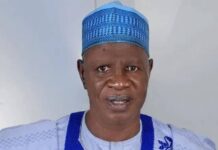The Arbiter
We grew up seeing the bogeyman here and there. Between 1967 and 1968, I lived with my paternal grandmother, Iya, later Hajia Iya after she visited Makkah in the mid-70s. Her name was Khadijah but her children called her Iya, meaning mother, and so we, their children, grew up calling her thus. Being a simple village woman, she was a farmer. When returning from the farm, she used to carry logs of wood, leaves for soup and giant grasshoppers, called bamba in the Bolewa language. Apart from the local seasoning, daddawa, grasshoppers too can spice up soups. Sometimes we roasted them. A real delicacy, especially those with eggs.
Enjoying the newly gained ability to walk without falling, I used to follow her to the farm on the outskirts of Fika, the land of the undulating plains. I became her storekeeper for the lighter things that motivate one to go to the farm. Nothing was lighter to me than bamba in those days. I never actually tilled the ground, for she won’t let me handle the hoe. But I ran after birds that swooped on the farm, plucking the juiciest bamba around. Or so I thought.
But the birds and the monkeys were also after the farm products. While I sought to protect what was a delicacy to me, Hajia Iya and her neighbouring farmers were therefore also concerned about the birds that reduced the destruction wreaked by grasshoppers on their farms. And the monkeys, too. So, they would erect a scarecrow – something that from a distance a monkey or a bird would take for a man about to pounce. That would scare them away and they would emit signals to their ilk that there awaited a wicked man ready to not only kill but devour them. What the villagers erected to chase off the pests is called a bogeyman.
We attribute to bogeyman qualities it does not possess so that its appearance induces fear and elicits hatred. Therefore, it is not the name that gives the bogeyman its attributes. Those attributes are inherent with whatever name we christen it with or in our minds. So, tired and in disagreement with the negritude tenets of the early and mid-century that turned the black man into a bogeyman, Wole Soyinka in 1964 at a conference in Berlin said, “A tiger does not proclaim his tigritude, he pounces.”
Sometimes a bogeyman is just the face of what the erectors want to be feared. For instance, when you erect a signpost in front of your house warning people to “Beware of snakes, dogs, electrocution, etc,” it is your house you want people to fear. The signpost, like the bogeyman, just gives a signal of what might happen when what they potentiate is breached. The signpost here as the bogeyman reflects on potential wickedness that makes the target hate the house or fear it. Or the farm.
The way people fear the tiger because of its tigritude qualities or animals hate the scarecrow in the farms, is the same fear and hate that, by deliberate design, some people want to transfer to the Fulani. Even though the Fulani have their fair share of criminals, it has now become fashionable to attribute every violent crime to them. The “Fulani” commits every crime, especially from Benue down South, as if the people there had never known crime. Though in most cases it turned out to be a bogey, the accusers show no remorse, nor do they apologise for their folly. But why should they? After all, they use the Fulani just as a bogeyman to get at the actual target.
The target is not President Muhammadu Buhari, as some are wont to adduce. No, not at all. The target is the North. Some think unless the North is vilified, hated, feared, even if on false reasons, they can never have power fall on their laps. The belief is that that was what happened in 1999. And so to them, that is only achievable through coarse blackmail, raw intimidation and the mobilisation of the gullible non-northerners against it. Northern minorities and Christians too can be carried on-board, they reason.
Little wonder charlatans have taken up this battle cry. From the now dead Gana in the valleys of the Benue to Sunday Igboho in the forests of Oduduwa down to the hills of the East where Nnamdi Kanu threatens constituted authority, the mobilisation is to hate the North through the Fulani bogeyman. Those who dictate when there will be peace have now filled in the vacuum vacated by a leadership that has abdicated its responsibility.
But that is a defeatist attitude and only shows up the emptiness of such politicians. Of-course boomerang it would. And when it boomerangs, they will realise that they have shot themselves in the foot. That’s how such things always end.
However, one politician who did not blackmail the North or fight it to gain power was the late Chief MKO Abiola. Agreed his election was annulled, sadly, but he won in the North, hands down. No man of substance would want to gain power through cheap routes. How can you savour victory when you got it through subterfuge? Can a student genuinely feel fulfilled passing an examination through malpractice, which is popularly termed “expo”?
The long-term problem associated with the student passing examinations through “expo” is national decline. A decline in the quality of services rendered. The decline in infrastructure and a decline in good governance. The massive decline in everything that we are now witnessing is a direct consequence of that. As mentioned earlier, I relate this to getting power through a cheap, ignoble route.
And the result is a dysfunctional nation; promising, yet unfulfilling. The nation gets saddled with leaders who have no sympathy and empathy for the citizenry; who disdain their people; A leadership more concerned with its welfare than that of the nation. Helmsmen who care little about the trajectory of their country’s development and how it is hurtling down the slopes head-long. Helmsmen who take from home to develop other lands.
With such people dotting our political landscape as governors and opinion leaders, one would not expect any leadership that would work to unite the people and make the country great. A governor should be the last person to speak in certain circumstances, and not the first. This is especially if the governor is running a one and a half kilometre race, dodging bullets in the bush. In that circumstance, a bogeyman could be a man with a bow and arrow about to shoot, just as a Jukun fisherman could be a Fulani herdsman, in his myopic eyes and rabble-rousing mischievous mind.
Is Sadiya Another Punching Bag?
A journalist friend met me a few days ago and was not happy that Sadiya Umar Farouq, minister of humanitarian affairs, disaster management and social development is being portrayed as a disaster despite all the good things she has been doing for the people of this country.
As mouthful as her portfolio sounds, that’s how she has reached out to the downtrodden in this nation, he tried to convince me. Without her ministry’s intervention in reaching to the youth through various schemes, perhaps the rate of youth restiveness might have been higher than it is now, this friend said.
Even though from afar she comes across as arrogant or snobbish, he believes it’s those who are not happy with her good works, as good as her good looks, that love to see bad in whatever she does.
Those who knew her in her youth think she has shut them out and become inaccessible, but he reasons that her work is enormous. What she handles can be likened to the heart of the country; if her work becomes a success, we would have a contented nation. He, therefore, reasons that the nature of what she handles would automatically shut out many people from her life. Not because she wants that.
My friend left me thinking hard. Is Sadiya just a punching bag, another man-made bogeyman to get at something, perhaps? The way Nigeria is moving now, anything seems possible. Sometimes only God in His Majesty knows.
Follow the Neptune Prime channel on WhatsApp:
Do you have breaking news, interview request, opinion, suggestion, or want your event covered? Email us at neptuneprime2233@gmail.com





